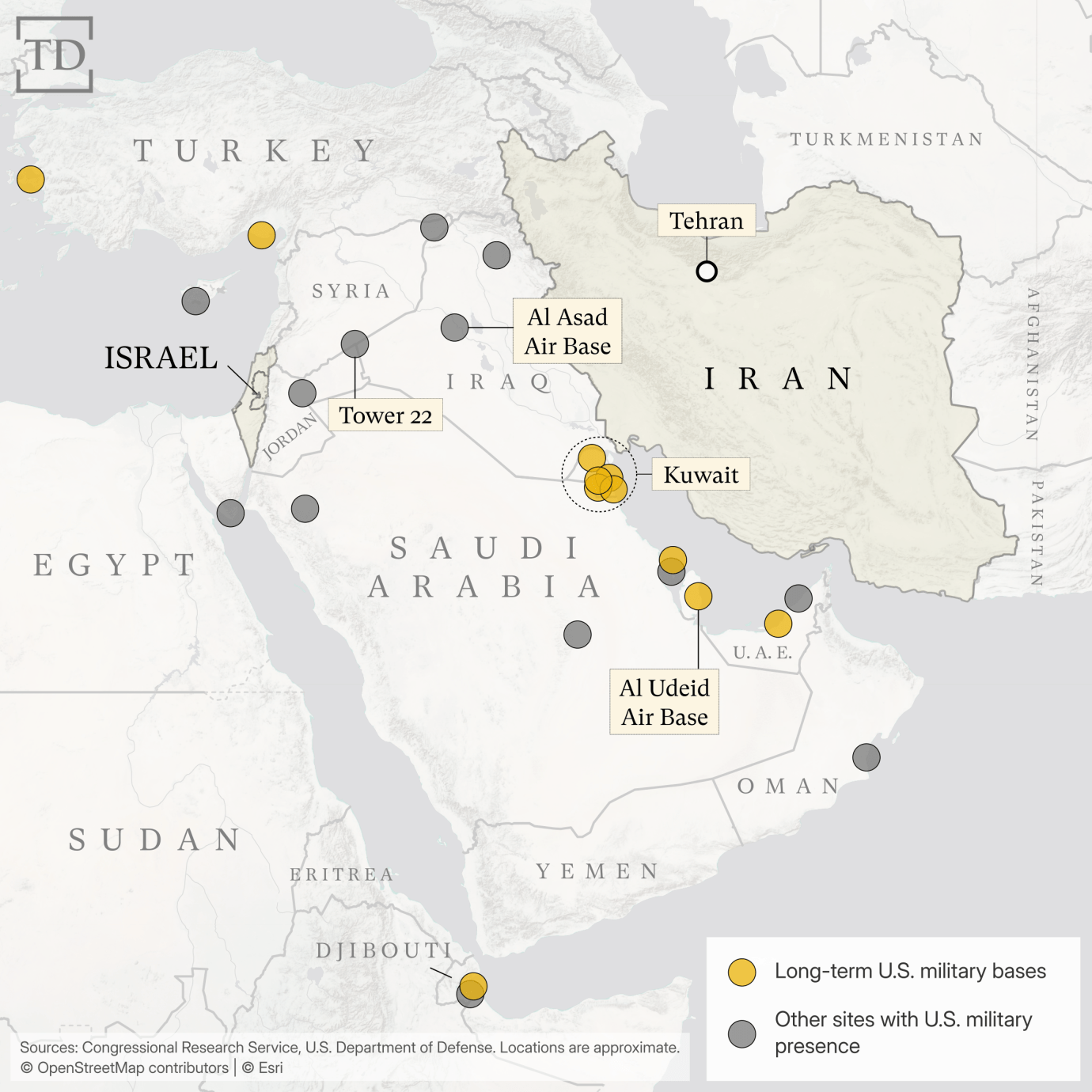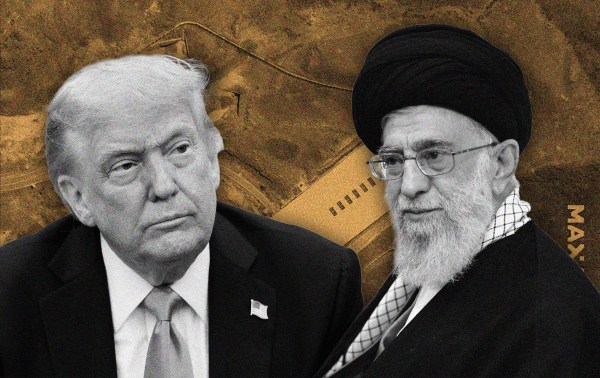You’re reading the free version of The Morning Dispatch. Consider joining as a paid member to get full access to our news, analysis, community comments, and live events.
Happy Tuesday! It’s never fun to misspeak, but we can only imagine the embarrassment a lawyer felt when, while arguing a case before the Colorado Court of Appeals, he accidentally called the judge “honey.”
“I left the practice of law almost two decades ago,” SCOTUSblog contributor David Lat wrote, “but even I know that you shouldn’t address a judge as ‘honey’ (unless you’re not in a courtroom and married to said judge).”
Quick Hits: Today’s Top Stories
- President Donald Trump on Monday announced that Israel and Iran had agreed to a ceasefire, effective at 7 a.m. Jerusalem time. The news came hours after an Iranian missile attack on the Al Udeid Air Base in Qatar, the regional headquarters for U.S. Central Command where some 10,000 American troops are stationed. No American casualties resulted from the attack, which marked Tehran’s first retaliatory strike following the U.S. bombing campaign on Iranian nuclear facilities over the weekend. On Truth Social, Trump said the attack was a “very weak response,” and thanked Iran “for giving us early notice” of the bombing. Also on Sunday, the State Department issued a worldwide security alert to U.S. citizens abroad, advising them “to exercise increased caution” in light of the recent fighting.
- Israel launched fresh airstrikes on Iran earlier on Monday, dropping more than 100 munitions at various targets over a two-hour period. The strikes hit military sites along with what Israeli Defense Minister Israel Katz described as “regime targets,” including the notorious Evin prison—where the Iranian regime holds political prisoners—and roads providing access to Iran’s Fordow nuclear facility, one of the three sites struck by American bombers over the weekend. The Israel Defense Forces (IDF) also said it destroyed the “Destruction of Israel” doomsday clock displayed in Tehran on an electronic billboard, which Iran’s state-run media disputed.
- A terrorist connected to the Islamic State opened fire and detonated an explosive vest during a Greek Orthodox church service in Syria’s capital of Damascus on Sunday, killing at least 25 people and wounding more than 60. The attack marked the first suicide bombing in Damascus since the fall of President Bashar al-Assad’s regime to Islamist rebel forces in December. The country’s new interim president, Ahmed al-Sharaa—whose fledgling administration is seeking the unified support of Syrian minority groups—denounced the bombing as “heinous” and promised to hold its planners accountable.
- Russia carried out drone and missile attacks across Ukraine overnight Sunday, Ukrainian officials said Monday, killing 14 and injuring dozens. The strikes, which targeted residential areas and hospitals, killed at least nine people in Kyiv after part of an apartment building collapsed. In a separate bombing on Monday, a Russian ballistic missile struck a high school in Ukraine’s southern Odesa region, killing two staff members, according to Ukrainian President Volodymyr Zelensky. No children were present at the school, which was on summer break. Also on Monday, Zelensky met with British Prime Minister Keir Starmer in London, where he pushed the West to ramp up sanctions on Russia.
- Crude oil prices fell 7 percent on Monday, more than any day since 2022, and futures were down early Tuesday after a ceasefire announcement. Analysts had warned prices could surge if hostilities between the U.S. and Iran escalate, particularly if Tehran followed through on its threats to block the Strait of Hormuz, a vital chokepoint for the world’s oil and gas supply. On Monday, Secretary of State Marco Rubio urged China—the world’s largest consumer of Iranian oil—to prevent the Islamic Republic from closing the shipping route.
- The Trump administration on Sunday appealed a court order mandating the release of Kilmar Abrego Garcia, the El Salvadoran national whom the federal government returned to the U.S. earlier this month after mistakenly deporting him to an El Salvadoran prison in March. Upon his return to the U.S. on June 6, federal prosecutors charged Abrego Garcia with human smuggling. He pleaded not guilty. On Sunday, U.S. Magistrate Judge Barbara D. Holmes ruled that Abrego Garcia was neither a flight risk nor a threat, ordering his release while his criminal proceedings unfold. The judge scheduled a hearing for Wednesday to determine conditions for Abrego Garcia’s release, though she noted in a 51-page opinion that U.S. immigration officials would likely detain him for separate, civil deportation proceedings.
Tug of War

Two days after American B-2 stealth bombers joined Israel in striking Iranian nuclear sites, Washington’s Iran foray may have ended as quickly as it began. In a Truth Social post Monday evening, President Donald Trump declared that Israel and Iran had agreed to a “Complete and Total CEASEFIRE” effective at 7 a.m. Jerusalem time, dubbing the conflict the “12 DAY WAR.”
“This is a War that could have gone on for years, and destroyed the entire Middle East,” he added, “but it didn’t, and never will! God bless Israel, God bless Iran, God bless the Middle East, God bless the United States of America, and GOD BLESS THE WORLD!”
Trump’s announcement came hours after Iran launched a retaliatory missile volley at the Al Udeid Air Base in Qatar, where an estimated 10,000 U.S. service members are stationed. The limited Iranian operation appeared to have been designed to avoid further escalation, but it remains unclear whether the Islamic Republic has more attacks in store. But regardless of whether it continues, the U.S. campaign to degrade Iran’s nuclear capabilities resurrected longtime debates over the president’s authority to initiate a military operation without congressional approval.

Neither American nor Qatari troops were harmed in Iran’s Monday assault on Al Udeid, the U.S. military’s main hub in the Middle East. Tehran reportedly warned Qatar broadly of its plans in advance, allowing the base to be evacuated ahead of the bombing. Describing the Iranian response as “very weak,” Trump called on the Islamic Republic to refrain from further attacks against both American and Israeli targets: “Perhaps Iran can now proceed to Peace and Harmony in the Region, and I will enthusiastically encourage Israel to do the same.” Shortly thereafter, the president declared the ceasefire.
But the situation remains unsettled. After Israel and Iran accepted the ceasefire Tuesday, Israel said Iran violated the truce by firing missiles two hours after it was supposed to take effect, actions the Islamic republic denied. Israeli defense minister Israel Katz said he would order additional strikes aimed at Tehran in light of “Iran’s blatant violation of the ceasefire declared by the President of the United States.”
If the ceasefire can take hold, the White House will have achieved its key goal: degrading Iran’s nuclear program without thrusting the region into a broader war. But Trump’s gambit raised concerns on Capitol Hill, as some lawmakers criticized his decision to intervene in the conflict without first consulting Congress. Although the administration conducted what White House press secretary Karoline Leavitt described as “bipartisan courtesy calls” to congressional leadership, it did not wait for congressional approval for its strikes on Iran.
Rep. Katherine Clark, the Democratic Whip in the House, called Trump’s unilateral decision to strike Iran unconstitutional. Several fellow Democrats seemed to agree, with Rep. Alexandria Ocasio-Cortez going as far as to say the attacks were grounds for impeachment.
Most Republicans, on the other hand, signaled their support for the strikes. House Speaker Mike Johnson posted a statement to X applauding Trump’s decision. “Leaders in Congress were aware of the urgency of this situation and the Commander-in-Chief evaluated that the imminent danger outweighed the time it would take for Congress to act,” Johnson said. “The President fully respects the Article I power of Congress, and tonight’s necessary, limited, and targeted strike follows the history and tradition of similar military actions under presidents of both parties.”
Years of “similar military actions” have blurred the distinction between Congress’ war powers and presidential authority. In 2024, President Joe Biden bombed Houthi forces in Yemen without requesting congressional approval, sparking criticism from his own party. Other administrations have conducted similar operations: During Trump’s first term, the U.S. assassinated Iranian Quds Force commander Qassem Suleimani without a green light from lawmakers. And in 2011, President Barack Obama authorized strikes against Libya without Congress’ permission. Bypassing Capitol Hill to take military action is both frequent and bipartisan—but its legality is another matter.
“A lot of people over the next few days are going to argue with confidence that President Trump violated, or didn’t violate, the Constitution when he bombed Iran over the weekend without congressional authorization,” Jack Goldsmith, a Harvard law professor and former assistant attorney general during the George W. Bush administration, wrote in his newsletter Executive Functions. “You might think that the Constitution would provide a clear answer to such a momentous question. But it doesn’t.”
The Constitution vests the power to declare war in Congress, but it also establishes the president as the Commander-in-Chief of the armed forces, muddying the legal waters of whether a president can initiate a conflict. “I think when the Constitution was written, it was probably not that complicated. Congress was given the power to declare war, then a bunch of other war powers, and the president was made the commander-in-chief,” Curtis A. Bradley, a law professor at the University of Chicago, told TMD. “But I think the design was, if the United States was going to enter into a war, you had to go through Congress in order to do it.”
There was an understanding, according to Bradley, that a president could respond to an attack but lacked the authority to start wars. But Congress has declared war only 11 times in U.S. history, and a far greater number of military conflicts have been ordered unilaterally by the president, particularly since World War II. “It’s happened so many times—hundreds of times—that it’s not clear that the answer today, at least, is that the president always has to go to Congress. Because, if so, we seem to be perpetually in breach of the Constitution,” Bradley said. “Congress hasn’t always objected to this, either.” Complicating the issue further, there are few court opinions to provide guidance.
During the Vietnam War, however, Congress tried to limit the power of the president by passing the War Powers Resolution, overriding a veto from President Richard Nixon. The law requires the president to notify Congress within 48 hours of deploying American troops, granting Congress the authority to recall forces. Ahead of the U.S. strike on Sunday, Reps. Thomas Massie and Ro Khanna unsuccessfully invoked the resolution in a bid to prevent an American attack.
But the law also gives the president 60 days to conduct a military operation before Congress can call back troops. This timeframe arguably provides the White House a significant amount of time to achieve military goals, as evidenced by the administration’s potentially one-off operation in Iran. “That’s the main enforcement provision in the War Powers Act,” Bradley said. “Presidents have not always complied with even that, I should be clear. But it also often just doesn’t come into play because presidents can act quickly.”
The Trump administration has not yet provided Congress with a legal justification for its decision to strike Iran’s nuclear program, a reporting requirement under the War Powers Resolution. Defense Secretary Pete Hegseth described the attacks as “self-defense” and in service of advancing American national interests, which the Office of Legal Counsel has previously recognized as a legitimate reason for launching a military operation without congressional approval.
“I wouldn’t be surprised if [the Trump administration] made some kind of argument that it was designed to be limited in scope and duration, and their hope was it wouldn’t escalate,” Bradley said. He anticipated the White House would cite limited military actions by previous administrations as well.
“That’s a reasonable argument, but the counter-argument is there was a much higher danger here of this turning into something quite significant,” Bradley added. “That wasn’t true of many of the other examples.”
Today’s Must-Read

What the Iran Strike Reveals About MAGA’s Future
Toeing the Company Line


Japan: Our Undervalued Asian Ally

What’s Next for the U.S. and Israel?

Regime Change
Worth Your Time
- Can industries reliant on migrant labor lure back American workers amid the Trump administration’s immigration crackdown? One meatpacking plant in North Platte, Nebraska, is trying to do just that, Scott Calvert, Arian Campo-Flores, and Patrick Thomas reported for the Wall Street Journal. “For decades, this old railroad hub was stuck. Some employers departed, Union Pacific cut rail-yard positions and young people fled. Now, officials are pinning their hopes on a slaughterhouse, which promises an economic jolt but represents a risky bet and a crucial question: Will Americans work there? ‘We needed to do something to stay relevant,’ said Pete Volz, a city council member. ‘Sustainable Beef was the catalyst.’ Opportunity and hope have ebbed away in parts of rural America, including North Platte, as farming has declined and economic dynamism has concentrated in urban center,” they wrote. “Taking matters into their own hands, North Platte leaders have embraced an industry that has long conjured images of bloody, hazardous working conditions while supplying products for American dinner tables. The company believes the gleaming plant will appeal to locals who never would have considered doing such work. Nationwide, over half of all front-line meatpacking workers are immigrants, according to the Center for Economic and Policy Research, and turnover is high.”
- For decades, Israel’s adversaries have placed losing bets on the Jewish state’s fragility. Iran and its proxy groups are no exception, Jeffrey Goldberg argued in The Atlantic. “One would think that Yahya Sinwar, until recently the leader of Hamas in Gaza, had absorbed the lessons of 1967. But he overestimated his own capabilities, and those of the Iranian-led ‘Axis of Resistance.’ Like the leaders of Iran, he spoke violently and with great confidence. He allowed his reasoning capabilities to be overwhelmed by conspiracism and supremacist Muslim Brotherhood theology. He also made the same analytical mistake [former Egyptian President Gamal Abdel] Nasser had made: He underestimated the desire of Israelis to live in their ancestral homeland, basing his conclusion on an incorrect understanding of how Israel sees itself,” he wrote. “In the end, the October 7 massacre Sinwar ordered did not cause the destruction of Israel but instead led to the dismantling of its enemies. Hamas is largely destroyed, and most of its leaders, including Sinwar, are dead, assassinated by Israel. Hezbollah, in Lebanon, is comprehensively weakened. Syria’s Bashar al-Assad, Iran’s main Arab ally, is in exile in Moscow, his country now led by Sunni Muslims hostile to Iran’s leaders. Iran’s skies are under the control of the Israeli Air Force, and its $500 billion nuclear program appears to be, at least partially, rubble and dust. Not since Nasser has anyone in the Middle East been proved so wrong so quickly.”
Presented Without Comment
Washington Post: Israeli Warning Call to Top Iranian General: ‘You Have 12 Hours to Escape’
People working for Israel’s security services who speak Persian, Iran’s primary language, called senior Iranian officials on their cellphones and warned them that they, too, would die unless they ceased supporting the regime of Ayatollah Ali Khamenei, Iran’s supreme leader, according to the three people, who spoke on the condition of anonymity to discuss clandestine operations. One of them estimated that more than 20 Iranians in positions of power were contacted.
Also Presented Without Comment
Associated Press: Pakistan Condemns Trump for Bombing Iran a Day After Recommending Him for a Nobel Peace Prize
Also Also Presented Without Comment
Reuters: Putin Says U.S. Strikes on Iran Are Pushing World to ‘Very Dangerous Line’
In the Zeitgeist
The Oklahoma City Thunder won the NBA championship Sunday night, the team’s first title since its relocation from Seattle in 2008. They defeated the Indiana Pacers 103–91, after Pacers point guard Tyrese Haliburton went down with an Achilles injury in the first quarter.
Let Us Know
Do you think Congress should seek to reclaim its authority to declare war?











Please note that we at The Dispatch hold ourselves, our work, and our commenters to a higher standard than other places on the internet. We welcome comments that foster genuine debate or discussion—including comments critical of us or our work—but responses that include ad hominem attacks on fellow Dispatch members or are intended to stoke fear and anger may be moderated.
With your membership, you only have the ability to comment on The Morning Dispatch articles. Consider upgrading to join the conversation everywhere.